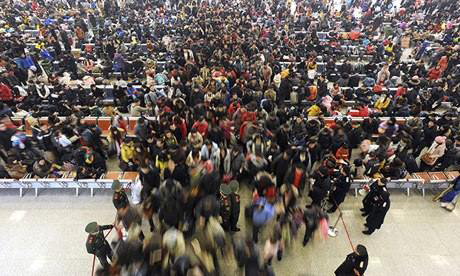
|
Imagine finalising plans for a long-awaited new year family reunion – calling the parents, booking flights – when suddenly, the government posts a simple document online that renders it all in vain. That's what has happened to many Chinese people, after the general office of the state council released its 2014 official holiday schedule. Many were shocked that it did not grant vacation time on Lunar New Year's Eve – an evening of ancestor worship and family reunion dinners, one of the most important nights of the traditional Chinese calendar. It has been an official holiday since 2007. "It's like a Thanksgiving dinner," said Apple Dai, a 29-year-old employee at the Beijing office of a European conglomerate. "You're supposed to spend the day with your family – it's a cultural thing. And now because ofChina's development, it feels like we're losing our culture." Next year's calendar will give workers 11 days off, including week-long vacations during the lunar new year – also known as the spring festival – and the anniversary of the October 1949 founding of the People's Republic of China. The official spring festival holiday will run from Friday 31 January until Thursday 6 February. Employees will be required to work on the weekends before and after to make up for lost time. State media outlets said the new schedule "reflects public opinion". Shi Peihua, a professor at Beijing Jiaotong University, told the state news agency Xinhua that the arrangement eliminates "very long consecutive work days in weeks before or after holidays". Dong Keyong, a professor at Beijing's Renmin University, said it avoids "the interruption of people's regular work and life". Yet more than 80% of nearly 180,000 respondents to a poll on Sina Weibo, the country's most popular microblog, said they were unsatisfied with the new arrangement. Many users proposed visiting government offices on Lunar New Year's Eve, to ascertain whether officials are working as hard as everyone else. "The spring festival holiday without Lunar New Year's Eve is like making love without foreplay," said one well-forwarded post. "Mum, if I can't make it home on time for new year's eve, please don't take me to court," said another user, referring to legislation passed this year that allows parents to sue their children for lack of filial piety. "I'm really worried about the migrant workers who live far away from home," wrote a third user. "For some, the vacation period will end while they're only halfway there." Dai said she plans to take leave on Lunar New Year's Eve anyway – she wants to get back to her home province, Anhui, in time for dinner. She doubts her company will be inhumane enough to keep her working. "You just tell your boss you want to go home early or something like that," she said. "And sometimes they'll just let you go." Because China's 1.3 billion people must abide by the same holiday schedule, the crush of hundreds of millions of travellers returning home to their families sends the country into overdrive. Flight costs rise; lines at train ticket offices take up entire city blocks. During the 2013 spring festival, Chinese people logged 3.42bn trips on public transport, according to Xinhua. |
请想象你已经最后敲定了期待已久的新年阖家团聚的计划,你已经打电话给父母并订好航班了,但是突然间,政府在网站上公布的一纸通知将这一切化为泡影。 在国务院下发了2014年的放假安排后,上述情况就发生在很多中国人身上。许多人讶异于除夕并未在节日行列。大年三十晚上是用来祭拜祖先,全家人共享年夜饭的,是中国农历中最重要的日子之一。从2007年开始就是法定节假日。 一名在北京工作的欧洲联合企业的戴姓员工表示,年夜饭就像是一顿感恩节晚餐,是一件具有文化意义的事情,所有人都应该和家人度过那一天;自从中国发展起来,我们的年味感觉少了许多。 明年的节假日将有11天,其中包括一周的春节假期和国庆节假期。法定的春节假期从1月31日(周五)至2月6日(周四)。调休的缘故,周末要正常上班。 官方媒体发布称,节日安排“体现了民意”。北京交通大学的施佩华教授告诉新华社说,安排取消了放假前后连续工作多天的情况。中国人民大学的董科勇教授说这个安排避免扰乱人们的工作和生活。 但在新浪微博上进行的一项调查显示,在将近18万参与投票的网民中,超过八成的人不满意这次的安排。很多用户表示要在除夕当天去拜访政府工作人员,看看他们是不是和其他人一样努力工作。 一条许多人转发的回复说道:“春节长假没有了除夕,就像性生活没有了前戏一样。”另一位用户说:“母亲,如果我在除夕当晚不能准时回家,请不要起诉我。”暗指今年通过的一项立法:父母可因孩子没有孝心而起诉他们。 还有一位用户说,非常替那些离家很远的农民工担心,因为他们之中有一些人在假期结束后可能还没回到家。 一位戴姓员工表示,她准备在大年三十回安徽,为了赶上年夜饭。她认为他的公司不会那么不近人情。她说,只要告诉上司你想早点回家,有时候他们就会让你走。 因为全中国13亿人都要遵守放假规定,返乡的巨大人潮使整个国家的运输系统过载。航班价格上升,购买火车票的队伍很长。根据新华社公布的数据,2013年春节,共有34.2亿人次使用公共交通出行。 (译者 lunchole 编辑 丹妮) |
